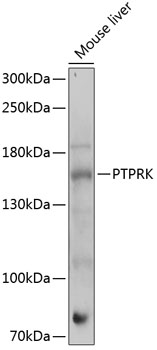Cell Biology Antibodies 5
Anti-PTPRK Antibody (CAB14773)
- SKU:
- CAB14773
- Product Type:
- Antibody
- Reactivity:
- Mouse
- Host Species:
- Rabbit
- Isotype:
- IgG
- Antibody Type:
- Polyclonal Antibody
- Research Area:
- Cell Biology
Description
| Antibody Name: | Anti-PTPRK Antibody |
| Antibody SKU: | CAB14773 |
| Antibody Size: | 20uL, 50uL, 100uL |
| Application: | WB |
| Reactivity: | Mouse |
| Host Species: | Rabbit |
| Immunogen: | Recombinant fusion protein containing a sequence corresponding to amino acids 600-750 of human PTPRK (NP_001129120.1). |
| Application: | WB |
| Recommended Dilution: | WB 1:500 - 1:2000 |
| Reactivity: | Mouse |
| Positive Samples: | Mouse liver |
| Immunogen: | Recombinant fusion protein containing a sequence corresponding to amino acids 600-750 of human PTPRK (NP_001129120.1). |
| Purification Method: | Affinity purification |
| Storage Buffer: | Store at -20'C. Avoid freeze / thaw cycles. Buffer: PBS with 0.02% sodium azide, 50% glycerol, pH7.3. |
| Isotype: | IgG |
| Sequence: | EGVD ASLN ETAT TITV LLRP AQAK GAPI SAYQ IVVE ELHP HRTK REAG AMEC YQVP VTYQ NAMS GGAP YYFA AELP PGNL PEPA PFTV GDNR TYQG FWNP PLAP RKGY NIYF QAMS SVEK ETKT QCVR IATK AAAT EEPE VIPD PAKQ TDR |
| Gene ID: | 5796 |
| Uniprot: | Q15262 |
| Cellular Location: | Cell junction, Cell membrane, Single-pass type I membrane protein, adherens junction |
| Calculated MW: | 162kDa/163kDa/164kDa |
| Observed MW: | 162kDa |
| Synonyms: | PTPRK, R-PTP-kappa |
| Background: | The protein encoded by this gene is a member of the protein tyrosine phosphatase (PTP) family. PTPs are known to be signaling molecules that regulate a variety of cellular processes including cell growth, differentiation, mitotic cycle, and oncogenic transformation. This PTP possesses an extracellular region, a single transmembrane region, and two tandem catalytic domains, and thus represents a receptor-type PTP. The extracellular region contains a meprin-A5 antigen-PTP mu (MAM) domain, an Ig-like domain and four fibronectin type III-like repeats. This PTP was shown to mediate homophilic intercellular interaction, possibly through the interaction with beta- and gamma-catenin at adherens junctions. Expression of this gene was found to be stimulated by TGF-beta 1, which may be important for the inhibition of keratinocyte proliferation. |
| UniProt Protein Function: | PTPRK: a receptor tyrosine phosphatase involved in processes including cell contact and adhesion, growth, tumor invasion, and metastasis. Is a negative regulator of EGFR signaling. Forms complexes with beta-catenin and gamma-catenin, and may modulate the phosphorylation status of beta-catenin. Absent or down-regulated in multiple melanoma cell lines and some melanoma tumors. The gene lies in a region frequently deleted in hematological neoplasms, melanomas, ovary carcinomas, and many other solid tumors. Can play a dual role of tumor suppressor and tumor promoter in mammary epithelial cells. Overexpression results in inhibition of basal proliferation and EGFR signaling in cancer cells. A key regulator of EGFR tyrosine phosphorylation and function in human keratinocytes. TGF-beta 1 stimulates its expression, which may be important for the inhibition of keratinocyte proliferation. Belongs to the protein-tyrosine phosphatase family, receptor class 2B subfamily. Four isoforms of the human protein are produced by alternative splicing. |
| UniProt Protein Details: | Protein type:Receptor protein phosphatase, tyrosine; EC 3.1.3.48; Motility/polarity/chemotaxis; Membrane protein, integral Chromosomal Location of Human Ortholog: 6q22.2-q22.3 Cellular Component: photoreceptor outer segment; adherens junction; cell surface; cell soma; integral to plasma membrane; axon; dendrite; integral to membrane; intercellular junction Molecular Function:protein binding; gamma-catenin binding; transmembrane receptor protein tyrosine phosphatase activity; beta-catenin binding; protein tyrosine phosphatase activity; protein kinase binding Biological Process: focal adhesion formation; negative regulation of cell proliferation; cell migration; transforming growth factor beta receptor signaling pathway; cell adhesion; signal transduction; protein amino acid dephosphorylation; negative regulation of transcription, DNA-dependent; negative regulation of cell migration; negative regulation of cell cycle |
| NCBI Summary: | The protein encoded by this gene is a member of the protein tyrosine phosphatase (PTP) family. PTPs are known to be signaling molecules that regulate a variety of cellular processes including cell growth, differentiation, mitotic cycle, and oncogenic transformation. This PTP possesses an extracellular region, a single transmembrane region, and two tandem catalytic domains, and thus represents a receptor-type PTP. The extracellular region contains a meprin-A5 antigen-PTP mu (MAM) domain, an Ig-like domain and four fibronectin type III-like repeats. This PTP was shown to mediate homophilic intercellular interaction, possibly through the interaction with beta- and gamma-catenin at adherens junctions. Expression of this gene was found to be stimulated by TGF-beta 1, which may be important for the inhibition of keratinocyte proliferation. [provided by RefSeq, Jul 2008] |
| UniProt Code: | Q15262 |
| NCBI GenInfo Identifier: | 219519675 |
| NCBI Gene ID: | 5796 |
| NCBI Accession: | AAI44514.1 |
| UniProt Secondary Accession: | Q15262,Q14763, Q5TG10, Q5TG11, B2RTQ8, |
| UniProt Related Accession: | Q15262 |
| Molecular Weight: | 162,102 Da |
| NCBI Full Name: | PTPRK protein |
| NCBI Synonym Full Names: | protein tyrosine phosphatase, receptor type, K |
| NCBI Official Symbol: | PTPRK |
| NCBI Official Synonym Symbols: | R-PTP-kappa |
| NCBI Protein Information: | receptor-type tyrosine-protein phosphatase kappa; protein-tyrosine phosphatase kappa; protein-tyrosine phosphatase, receptor type, kappa; dJ480J14.2.1 (protein tyrosine phosphatase, receptor type, K (R-PTP-KAPPA, protein tyrosine phosphatase kappa , protein tyrosine phosphatase kappa |
| UniProt Protein Name: | Receptor-type tyrosine-protein phosphatase kappa |
| Protein Family: | Receptor-type tyrosine-protein phosphatase |
| UniProt Gene Name: | PTPRK |
| UniProt Entry Name: | PTPRK_HUMAN |







